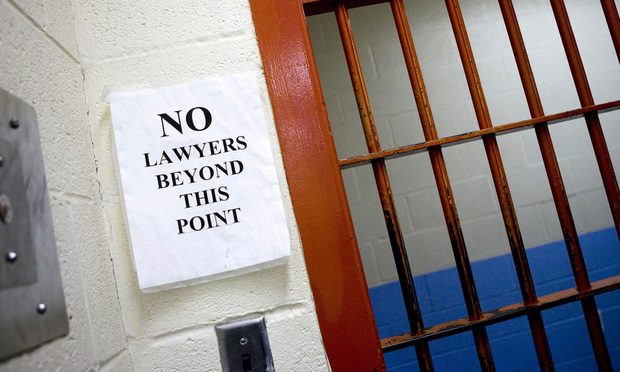Judge Won't Move Detained Immigrants' Access-to-Counsel Case to Georgia
“For decades, the Department of Homeland Security, Immigration and Customs Enforcement, and their officials ... have deliberately detained people in immigration prisons far away from legal resources,” the Southern Poverty Law Center alleged.
May 10, 2019 at 05:06 PM
4 minute read
 (Photo: Diego M. Radzinschi/ALM)
(Photo: Diego M. Radzinschi/ALM)
A federal judge in Washington, D.C., has denied the U.S. Department of Homeland Security's attempt to sever and transfer to Georgia a lawsuit alleging deliberate denial of access to counsel for immigrants being detained while seeking asylum.
The Southern Poverty Law Center filed the lawsuit April 4 over immigrants detained in three locations—two in Georgia and one in Louisiana. First, Homeland Security lawyers asked to break the case up into three separate lawsuits, then move them to different courts.
On Friday, Judge Judge Colleen Kollar-Kotelly of the U.S. District Court for the District of Columbia said no.
 U.S. District Judge Colleen Kollar-Kotelly (Photo: Diego M. Radzinschi/ALM)
U.S. District Judge Colleen Kollar-Kotelly (Photo: Diego M. Radzinschi/ALM)“Defendants would have the Court transfer the respective cases as follows: the case involving LaSalle Detention Facility, in Jena, Louisiana, to the Western District of Louisiana; that regarding Irwin County Detention Center in Ocilla, Georgia, to the Middle District of Georgia, Valdosta Division; and that concerning Stewart Detention Facility in Lumpkin, Georgia, to the Middle District of Georgia, Columbus Division,” Kollar-Kotelly said. “The main reason that Plaintiffs oppose the severance and transfer is their insistence that this case is about Defendants' administration of detention policies—in particular, the Performance Based National Detention Standards (“PBNDS”)—that apply to all three facilities. Those Defendants are predominantly located in this jurisdiction.”
The judge also denied the defense's alternative request to transfer the whole case to the Middle District of Georgia.
She said the Southern Poverty Law Center has “styled this as a case focused on national issues of immigrants' access to counsel during detention; accordingly, the local interest in conditions at the individual detention facilities weighs less heavily than the national interests involved. Those national interests include, at the least, the proper nationwide enforcement of standards governing access to counsel for detained immigrants. The Court is not persuaded that the public interest factors warrant transfer of this case.”
Geography is central to the complaint as well.
“For decades, the Department of Homeland Security, Immigration and Customs Enforcement, and their officials (“Defendants”) have deliberately detained people in immigration prisons far away from legal resources,” the complaint said. “Consistent with this longstanding practice, Defendants have contracted with local municipalities and private prison companies to detain noncitizens in some of the most rural and remote locales in the Southeast—far from major cities, law firms, nonprofit legal organizations, and professional interpretation services.”
At the same time, immigrants represented by counsel are 10 times more likely to succeed in their cases, the Southern Center said.
Lisa Graybill of the Southern Poverty Law Center said Friday's decision was important to the case.
“It's fundamental that these complaints be litigated collectively,” she said.
Attorneys for the Department of Homeland Security could not be reached immediately.
The complaint said the federal government “currently detains hundreds of thousands of noncitizens in civil immigration prisons each year,” and, “These detainees include both documented and undocumented people. Many have been in the United States for years and have strong family and community ties. Others have arrived more recently, frequently after fleeing persecution in their home countries.”
The complaint contends that the basis for detention is civil, not criminal.
“Many of these detained people have claims that would allow them to remain in the United States, and many also have viable claims that they should be released on bond or parole pending completion of their removal proceedings,” the complaint said. “Legal representation often ensures that such people are not unnecessarily detained for long periods of time, and also frequently makes the difference between whether they are allowed to remain safely in the United States or are permanently separated from family and returned to danger or even death.”
This content has been archived. It is available through our partners, LexisNexis® and Bloomberg Law.
To view this content, please continue to their sites.
Not a Lexis Subscriber?
Subscribe Now
Not a Bloomberg Law Subscriber?
Subscribe Now
NOT FOR REPRINT
© 2025 ALM Global, LLC, All Rights Reserved. Request academic re-use from www.copyright.com. All other uses, submit a request to [email protected]. For more information visit Asset & Logo Licensing.
You Might Like
View All
Law Firm Sued for Telemarketing Calls to Customers on Do Not Call Registry



A Look Back at High-Profile Hires in Big Law From Federal Government
4 minute readTrending Stories
- 1No Two Wildfires Alike: Lawyers Take Different Legal Strategies in California
- 2Poop-Themed Dog Toy OK as Parody, but Still Tarnished Jack Daniel’s Brand, Court Says
- 3Meet the New President of NY's Association of Trial Court Jurists
- 4Lawyers' Phones Are Ringing: What Should Employers Do If ICE Raids Their Business?
- 5Freshfields Hires Ex-SEC Corporate Finance Director in Silicon Valley
Who Got The Work
J. Brugh Lower of Gibbons has entered an appearance for industrial equipment supplier Devco Corporation in a pending trademark infringement lawsuit. The suit, accusing the defendant of selling knock-off Graco products, was filed Dec. 18 in New Jersey District Court by Rivkin Radler on behalf of Graco Inc. and Graco Minnesota. The case, assigned to U.S. District Judge Zahid N. Quraishi, is 3:24-cv-11294, Graco Inc. et al v. Devco Corporation.
Who Got The Work
Rebecca Maller-Stein and Kent A. Yalowitz of Arnold & Porter Kaye Scholer have entered their appearances for Hanaco Venture Capital and its executives, Lior Prosor and David Frankel, in a pending securities lawsuit. The action, filed on Dec. 24 in New York Southern District Court by Zell, Aron & Co. on behalf of Goldeneye Advisors, accuses the defendants of negligently and fraudulently managing the plaintiff's $1 million investment. The case, assigned to U.S. District Judge Vernon S. Broderick, is 1:24-cv-09918, Goldeneye Advisors, LLC v. Hanaco Venture Capital, Ltd. et al.
Who Got The Work
Attorneys from A&O Shearman has stepped in as defense counsel for Toronto-Dominion Bank and other defendants in a pending securities class action. The suit, filed Dec. 11 in New York Southern District Court by Bleichmar Fonti & Auld, accuses the defendants of concealing the bank's 'pervasive' deficiencies in regards to its compliance with the Bank Secrecy Act and the quality of its anti-money laundering controls. The case, assigned to U.S. District Judge Arun Subramanian, is 1:24-cv-09445, Gonzalez v. The Toronto-Dominion Bank et al.
Who Got The Work
Crown Castle International, a Pennsylvania company providing shared communications infrastructure, has turned to Luke D. Wolf of Gordon Rees Scully Mansukhani to fend off a pending breach-of-contract lawsuit. The court action, filed Nov. 25 in Michigan Eastern District Court by Hooper Hathaway PC on behalf of The Town Residences LLC, accuses Crown Castle of failing to transfer approximately $30,000 in utility payments from T-Mobile in breach of a roof-top lease and assignment agreement. The case, assigned to U.S. District Judge Susan K. Declercq, is 2:24-cv-13131, The Town Residences LLC v. T-Mobile US, Inc. et al.
Who Got The Work
Wilfred P. Coronato and Daniel M. Schwartz of McCarter & English have stepped in as defense counsel to Electrolux Home Products Inc. in a pending product liability lawsuit. The court action, filed Nov. 26 in New York Eastern District Court by Poulos Lopiccolo PC and Nagel Rice LLP on behalf of David Stern, alleges that the defendant's refrigerators’ drawers and shelving repeatedly break and fall apart within months after purchase. The case, assigned to U.S. District Judge Joan M. Azrack, is 2:24-cv-08204, Stern v. Electrolux Home Products, Inc.
Featured Firms
Law Offices of Gary Martin Hays & Associates, P.C.
(470) 294-1674
Law Offices of Mark E. Salomone
(857) 444-6468
Smith & Hassler
(713) 739-1250






